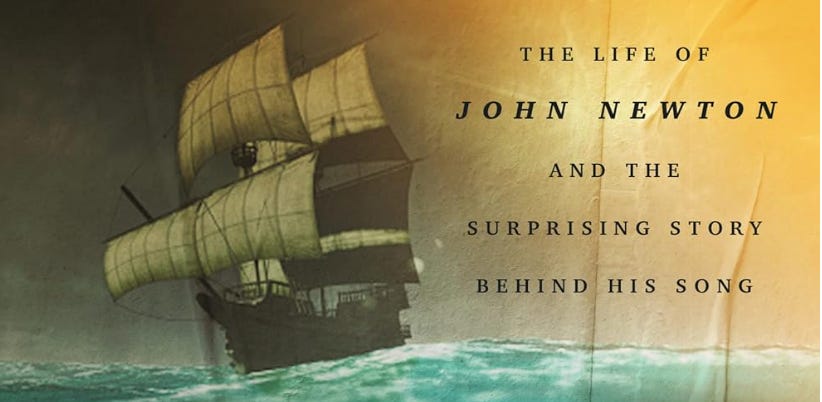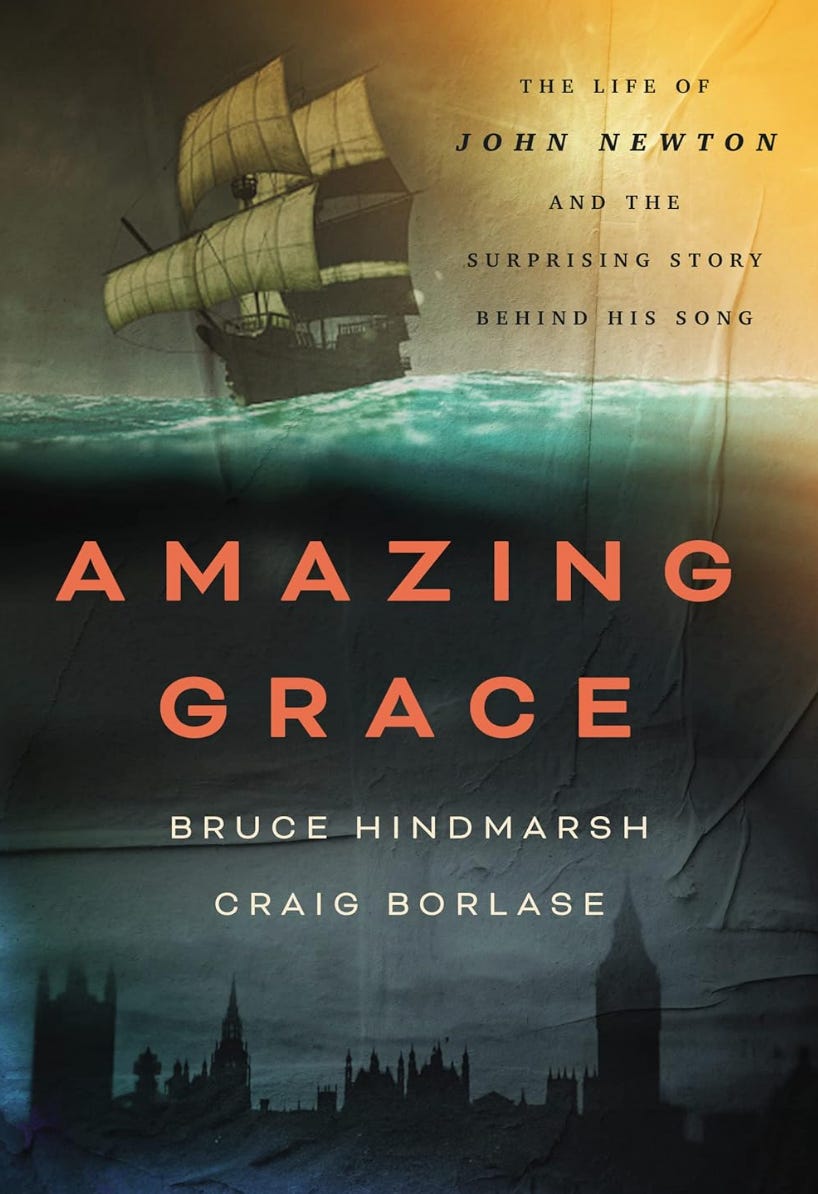Kris and I both read biographies. Kris especially likes the memoirs and autobiographies. The biographies I read tend to be about authors I am reading. So, recently I worked my way through Rosamund Bartlett’s biography of Tolstoy. I was reading The Everyman’s Library short stories of Tolstoy and wanted to know more about the man behind, and in, the stories. I put down Charles Marsh’s introspective, memoir-ish Evangelical Anxiety to write this Substack about a recent biography I read: Bruce Hindmarsh, an exceptional historian of the church, and Craig Borlase joined hands to write a perfectly paced biography of John Newton. Newton is most famous for his hymn “Amazing Grace,” which I would estimate nearly every American can join in singing when somehow breaks into the scene. The book has the not-surprising title Amazing Grace: The Life of John Newton and the Surprising Story Behind His Song.
I was surprised by a number of elements in the story of John Newton, and I was surprised in part because I didn’t know much about him.
First, his family life was unappealing and did not encourage the later direction of his life. His father was a shipmaster, a serious tough, rough and gruff and seemingly unbothered by the need to love his son, a man of strength in the town. His mother, a nonconformist Christian, prayed for and worked for John’s conversion and commitment to the way of Christ. John made some shipping trips with his father and then his father worked to get him a job in Jamaica in the sugar trade.
Second, John failed to do the right thing over and over. He was driven by his passions, by the moment, and a life-long commitment not to deliberate over decisions. Which landed him in more trouble than it helped him, though Malcolm Gladwell’s Blink might suggest otherwise. He fell in love with Polly, and was not the right person for her at the time, and her family agreed.
Third, Newton could not seem to do the right thing over and over. For instance, on board the Royal Navy’s HMS Harwich John tried to escape, returned, was severely beaten in discipline… ended up on an island off Africa serving a man who had married an African queen… this turned sour and he was shackled and became a slave of the couple and other slaves and servants… a man discovered him, helped him get to another boat… one caper after another. It is almost hard to believe some of the stories and situations Newton found himself in.
Break: the authors of this book are skilled in narrating. Hints and glimpses of Newton’s future life as a thorough convert and a pastor who pastored people instead of seeking large platforms and handsome pulpits in London. But we get only glimpses. Because I knew some of where the book was headed – at least the title gives the big clue – I was wanting more but the authors were intent on leading me straight into the pits of hell with Newton before they were going to give any evaluation of the man or tell us what happened later. In that, the book is a smashing success.
Fourth, John Newton became a slave trader, making a number of trips down the African coast to evaluate, purchase, enslave, strap into the lower chambers of a slave ship, disciplining the threatening, wandering a bit here and there in and out of genuine faith in Christ, selling slaves in the Caribbean/West Indies, returning to England in his search for Polly. Whom he married while being a slave trader. The violence against Africans on these ships is appalling, needs to be known and recognized, and Newton participated in it. With some tendencies to kindness. But a slave is a slave is a slave, and it means a body is owned, and the bodies owned are black bodies that are degraded for their blackness. At this point in his story I despised Newton. Not because I was on my perch with a superior morality but because I didn’t want the author of that hymn to have this in his past nor did I want him to have the character on display in these scenes.
Fifth, Newton (begins to) convert in 1748 and a death-defying storm at sea intensified his faith, and then he begins to come to terms with himself on a return to trip to England, with the slave trade though he continued for half a decade in slave trading, with a desire to live in England with his wife (Mary “Polly” Catlett) and family and friends. His conversion continues to form a redeemed character. So, over more than a decade, while working as a tax collector, he pursues a theological education, knowing already that his gifts for preaching and telling truth-stories about humans and sin. He becomes an Anglican priest/pastor in 1764 in a city named Olney and then in London in 1779.
Sixth, he wrote hymns and this was intensified and improved and bested by his close friend, William Cowper (=cooper). Newton wrote “Glorious Things of Thee Are Spoken” but is best known for his amazing hymn “Amazing Grace.” Newton’s pastoral relationship with Cowper, including in his later years when depression had overcome the man.
Sixth, Newton became slowly – too slowly as I read his story – opened up slowly and painfully about slaves, about his own real participation in slave trading, and so committed himself to participating with others, including Wilberforce, in working for the abolition of slavery. He died in 1807, attended by the many he loved.
This is a very good read, one I could not put down. I will refer to it, and I will at some point read more of Hindmarsh’s editions of Newton’s own writings.






A life story that makes the words in Amazing Grace even more amazing!
I love John Newton's story which gives me so much hope. I'm going to get this book. Thank you.